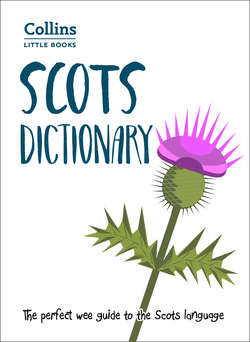Читать книгу Scots Dictionary: The perfect wee guide to the Scots language - Collins Dictionaries, Collins Dictionaries - Страница 27
Оглавлениеclose
close (klohss) In much of Scotland, a close is a narrow lane or passageway leading off a main street: The restaurant is tucked away at the foot of a close off the High Street. Close is often part of the name of such lanes: Advocates Close; Mary King’s Close. A close may also be a passageway connecting a group of houses to a main street. In Glasgow and West Central Scotland, the common entry and stairway from the street in a tenement building is known as a close: Reared up a close in Govan, he feared no-one. In Glasgow and West Central Scotland, a close is also all the flats sharing such a common entry and stairway: The whole close could hear the noise.
cludgie In Scotland’s Central Belt, a cludgie is a toilet: A wee boy’s got locked in the cludgie. [The word is perhaps a conflation of closet and ludge, a Scots form of lodge]
Clyde The Clyde is a river in South Scotland, 170 kms (106 miles) long, rising in South Lanarkshire and flowing northwest to the Firth of Clyde. It divides the City of Glasgow in two and was once the centre of the world’s largest shipbuilding industry, where every type of ship, from ocean liners and battleships to dredgers, were built. At its peak 14 ships a day were launched on the Clyde, and the term Clyde-built was synonymous with quality.
Clydesdale A Clydesdale is a heavy, powerful workhorse of a breed that originated in Scotland.
Clydeside Clydeside is the area of industrial or post-industrial towns along the lower length of the river Clyde. Clydeside also refers to the shipbuilding industry in this area: the Queen Mary, another famous Clydeside ocean liner. Red Clydeside refers to the militant socialist trade union and political activity in the West of Scotland, particularly in the period between the two world wars. Unemployment and disenchantment with governments who were unable to deliver their promises of a better life for working people following the Great War led to greater militancy among the industrial working classes and this was reflected in the number of socialist candidates elected to Parliament from the area.
clype or clipe A clype is a person who tells tales or informs on his or her friends, colleagues, or schoolmates. To clype
